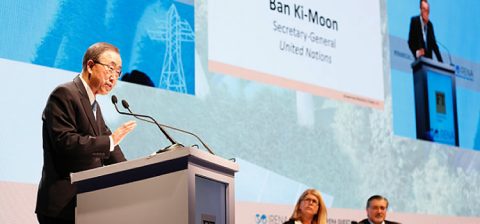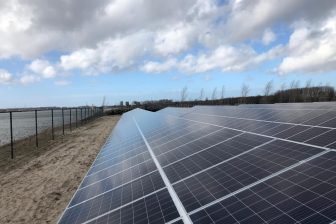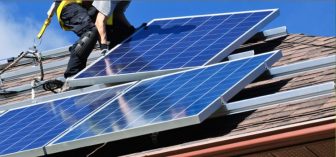
‘Wereldeconomie gebaat bij snelle verduurzaming energie’
21 januari 2016 – ‘Leadership at all levels is key to achieve and surpass the emission reduction targets set forth in the Paris Agreement. Global focus is shifting from negotiation to action.’ IRENA-baas Amin leidde het eerste mondiale overleg na ‘Parijs’.
Op een tweetal bijeenkomsten van IRENA (International Renewable Energy Agency) in Abu Dhabi hebben vele honderden vertegenwoordigers van landen, bedrijven en betrokken organisaties overlegd over de volgende stappen na COP21. Het was het eerste mondiale overleg na Parijs. Ook de secretaris-generaal van de VN, Ban Ki-Moon, en de VN-klimaatchef Christina Figueres deden mee.
Eén van de conclusies was dat met een doortastend snelle transitie naar veel meer hernieuwbare energie het nog steeds mogelijk is de opwarming van de aarde onder de 2 graden te houden. Een rapport van IRENA liet zien dat de wereldeconomie er zelfs bij gebaat is.
Uit een bericht van IRENA
“After the Paris climate conference in December, global focus is shifting from negotiation to action,” said IRENA Director-General Adnan Z. Amin. “Leadership at all levels is key to achieve and surpass the emission reduction targets set forth in the Paris Agreement.”
Uit een verslag van The Guardian
‘(…) Irena said those goals were within reach – if countries move fast. Scaling up renewable energy to 36% of the global energy mix by 2030 would provide about half of the emissions reductions needed to hold warming to 2C. Energy efficiency could make up the rest. (…) In an effort to spur countries to action, an Irena report released on Saturday found doubling the share of renewables by 2030 would increase global GDP by up to 1.1% or about $1.3tn, and provide jobs for more than 24 million in the renewable sector. (…)’
 Rapport
Rapport
Uit het persbericht over het rapport
‘(…) Achieving a 36 per cent share of renewable energy in the global energy mix by 2030 would increase global gross domestic product (GDP) by up to 1.1 per cent, roughly USD 1.3 trillion, according to new analysis by IRENA. Renewable Energy Benefits: Measuring the Economics, released today at IRENA’s sixth Assembly, provides the first global estimate of the macroeconomic impacts of renewable energy deployment. Specifically, it outlines the benefits that would be achieved under the scenario of doubling the global share of renewable energy by 2030 from 2010 levels.
“The recent Paris Agreement sent a strong signal for countries to move from negotiation to action and rapidly decarbonise the energy sector,” said Adnan Z. Amin, IRENA Director-General. “This analysis provides compelling evidence that achieving the needed energy transition would not only mitigate climate change, but also stimulate the economy, improve human welfare and boost employment worldwide.”
Beyond finding that global GDP in 2030 would increase by up to USD 1.3 trillion – more than the combined economies of Chile, South Africa and Switzerland as of today – the report also analyses country-specific impact. Japan would see the largest positive GDP impact (2.3 per cent) but Australia, Brazil, Germany, Mexico, South Africa and South Korea would also see growth of more than 1 per cent each.
According to the report, improvements in human welfare would go well beyond gains in GDP thanks to a range of social and environmental benefits. The impact of renewable energy deployment on welfare is estimated to be three to four times larger than its impact on GDP, with global welfare increasing as much as 3.7 per cent. Employment in the renewable energy sector would also increase from 9.2 million global jobs today, to more than 24 million by 2030.
A transition towards greater shares of renewables in the global energy mix would also cause a shift in trade patterns, as it would more than halve global imports of coal and reduce oil and gas imports, benefiting large importers like Japan, India, Korea and the European Union. Fossil fuel exporting countries would also benefit from a diversified economy.
“Mitigating climate change through the deployment of renewable energy and achieving other socio-economic targets is no longer an either or equation,” said Amin. “Thanks to the growing business case for renewable energy, an investment in one is an investment in both. That is the definition of a win-win scenario.” (…)’
Bronnen
IRENA, 17 januari 2016: Scaling Up Renewables: Taking Climate Action to the Next Level
IRENA, 16 januari 2016: Increasing World’s Share of Renewable Energy Would Boost Global GDP up to $1.3 Trillion
Rapport: Renewable Energy Benefits: Measuring the Economics (pdf, 92 pag.)
IRENA over het rapport
The Guardian, 16 januari 2016: Rapid switch to renewable energy can put Paris climate goals within reach
Foto: IRENA



